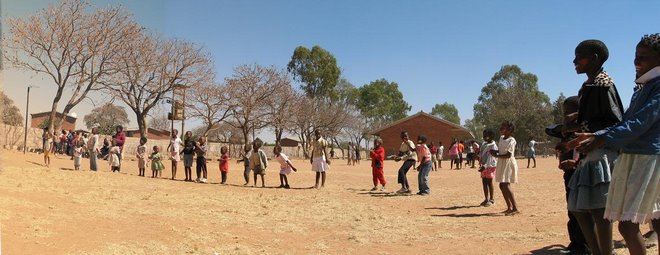Southern Africa is a place where survival often requires entrepreneurial ability. As the economy in Zimbabwe continues to destabilize and necessities become harder to acquire, people have been forced to find new and creative ways of gathering basic resources such as food, water, and clothing. Many of the poor rely on their own entrepreneurial ventures to create income or produce goods and services which they may trade directly for other goods and services. The people of southern Africa have shown amazing resolve, intuition, and initiative in creating their own income generating micro-enterprises such as rice-husking, machine repair, raising chickens, stool making, basket weaving, wood carving, or sculpture that uniquely serve their local communities. Although they may be poor, these people are business owners. The fact that they continue to survive, in an economic reality were you or I would almost surely perish, demonstrates how hard they work to provide for themselves and their families. I think that Jesus personally understands their struggle, but perhaps for a different reason than you may initially think.
I was recently introduced to a book entitled Anointed for Business in which author Ed Silvoso contends that we underestimate the importance of Jesus’ primary trade and earthly profession. Silvoso explains that Jesus would have been educated in carpentry during his early teenage years, so by the time of his baptism he would have been working at this profession for some time. “He was not a mere apprentice, but a well-established artisan,” Silvoso writes. He continues by saying, “I suspect that many of his neighbors ate at tables made by Jesus and secured their home with doors built in his shop. Their houses could have had beams cut and fit by the Savior. Even some of their oxen may have worn Jesus-made yokes.”
Jesus likely would have run his carpentry business at a profit in order to ensure its survival and help provide for his family. Silvoso comments, “His daily business routine likely included the calculation of the cost of goods and labor, the interplay between supply and demand, the establishment of competitive pricing, the measurement of potential return on his investment, the estimation of maintenance costs and the replacement of equipment. Even though it may be unusual, even uncomfortable, for us to picture Jesus working to make a living, this is precisely what he did for most of his adult life.”
Jesus, the very Son of God, was a hard-working business owner. As such, I believe that he uniquely understands the plight of the poor in southern Africa who are struggling to ensure their survival with small income generating projects. I am particularly proud of the work Forgotten Voices is doing to help our African brothers and sisters by providing them with an opportunity to purchase their own tools, equipment, or other necessary means of production to embark on income-generating ventures which will allow them to escape cyclical poverty. This is about more than just helping someone make money. Instead, it is mechanism for others to realize their God given potential for productivity and experience the divine blessing which results as a consequence of gainful, liberating labor. It’s about giving someone a chance to follow their dreams. Forgotten Voices has recently established one such program in Zambia with the partnership of CURE International. Tomorrow, I would like to share with you a little about this exciting new venture.
Please consider what you may do during this Advent time to honor Jesus' beginnings as humble carpenter. Many in Zimbabwe and Zambia are being given the chance to escape poverty due to the generous contributions of those in the West. Click here to join us in this noble pursuit.
Wishing you good work and blessings,
Jesse





No comments:
Post a Comment